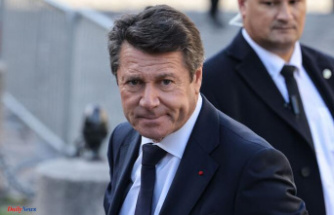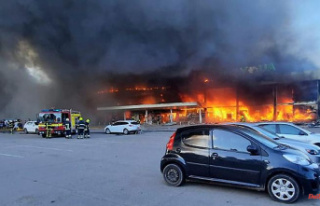The situation at Europe's largest nuclear power plant is "unsustainable", as the International Atomic Energy Agency has stated. UN Secretary-General Guterres is therefore calling for an end to "military activities". And Germany made it clear to the UN Security Council how it could have come to this.
UN Secretary-General Antonio Guterres has called on Russia and Ukraine to create a demilitarized zone around the occupied Zaporizhia nuclear power plant. "Russian and Ukrainian armed forces must undertake not to conduct any military activities towards or from the factory premises," Guterres told the UN Security Council in New York.
The Zaporizhia facility and its surroundings should not be a target or platform for military operations, there must be an agreement on a demilitarized zone. The International Atomic Energy Agency (IAEA) had previously called for the establishment of a safety zone around Europe's largest nuclear power plant.
Germany, meanwhile, gave Russia responsibility for the dangerous situation around the nuclear power plant before the UN Security Council. "It is Russia that is militarizing the power plant. It is Russia that is stationing equipment and troops at the site," Germany's deputy ambassador to the UN, Thomas Zahneisen, told the United Nations' most powerful body in New York. The nuclear power plant is endangered because of the Russian occupation of the site.
In view of ongoing armed conflicts at the Zaporizhia nuclear power plant, the IAEA had previously called for rapid action to be taken against the "unsustainable" situation on site. In a report on the situation around Europe's largest nuclear power plant, the IAEA warned of a "nuclear accident" and called for the establishment of a "safety zone".
The 52-page IAEA paper released on Tuesday followed a mission by the agency to the power plant. According to the IAEA report, the "bombing of the plant and the surrounding area" would have to "be stopped immediately" in order to avoid further damage. The organization also wrote of "extremely stressful conditions" under which Ukrainian nuclear plant personnel, who are under the control of Russian soldiers, work.
In addition, transitional measures are "urgently" needed to prevent a "nuclear accident" that could be triggered by "damage caused by military means," the IAEA said. This could be achieved by "immediate establishment of a nuclear safety zone".
Ukrainian President Volodymyr Zelenskyy welcomed the IAEA report. Zelenskyy said in his daily video message that it was "a good thing" that the report mentioned Russian military equipment on the premises and the "pressure on our employees".
Russian Ambassador to the UN Vasily Nebensia expressed his regret that the report did not blame Ukraine for the attacks. It is "very important to call things by their proper name," said Nebensja at a meeting of the UN Security Council, which was also attended by IAEA chief Rafael Grossi.
Meanwhile, Kyiv and Moscow again accused each other of having bombed the southern Ukrainian city of Enerhodar, which is close to the nuclear power plant. There are "explosions in the city", the provocations and the "shelling of the occupiers" continue, wrote the exiled mayor of Enerhodar, Dmytro Orlov, on online networks.
Russia had previously accused Ukraine of shelling both the city and the power plant site. Within 24 hours, Ukrainian forces shelled the nuclear power plant and Enerhodar 15 times with artillery, the Russian Defense Ministry wrote on Telegram. Moscow accused Kyiv of "raising the risk of a man-made disaster."
The site of the Zaporizhia nuclear power plant had been repeatedly shelled in recent weeks. Ukraine and Russia blame each other for the attacks. Zaporizhia is the largest nuclear power plant in Europe. The fighting around the nuclear power plant is fueling fears of a nuclear catastrophe like the one in Chernobyl in 1986.
According to the Ukrainian state operator Energoatom, the last working reactor in the Zaporizhia nuclear power plant was only taken off the grid on Monday. The reason is said to be a fire triggered by attacks that damaged a power line between the power plant and the Ukrainian power grid.












